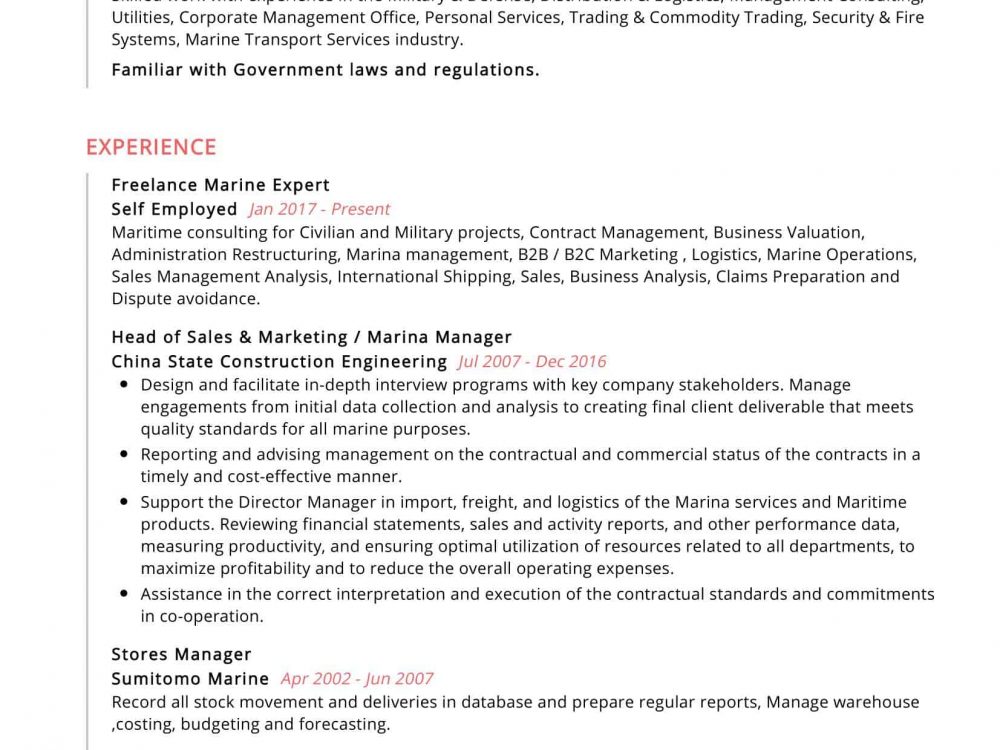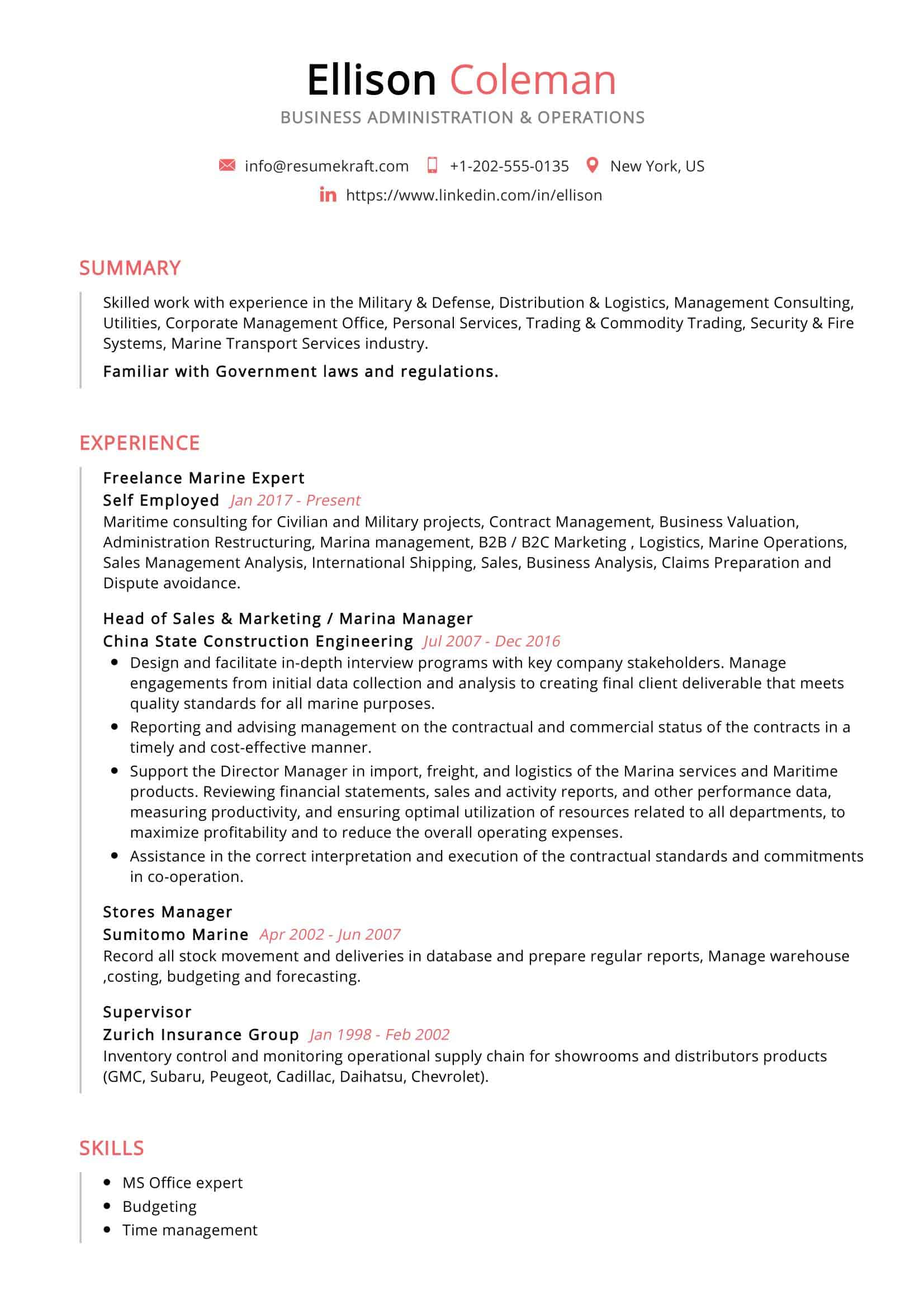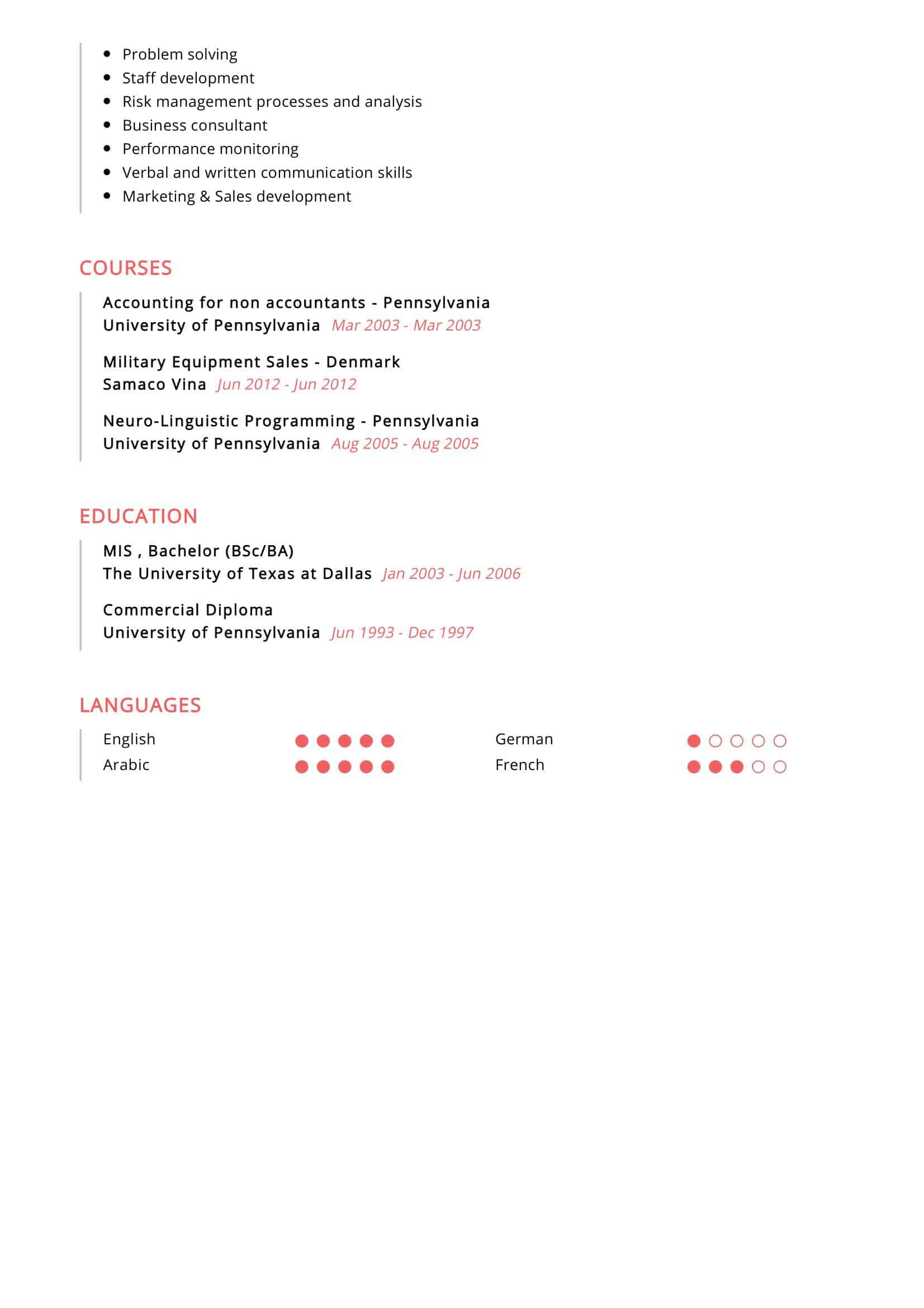Are you a Business Administration by profession and looking for an exciting career? We have good news for you! use our professional Business Administration Manager Resume Sample. You don’t have to start writing from scratch. Just click “Edit Resume” and modify it with your details. Update the template fonts and colors have the best chance of landing your dream job. Find more resume samples.
Business Administration Resume Example
Ellison Coleman
Business Administration & Operations
Summary
Skilled work with experience in the Military & Defense, Distribution & Logistics, Management Consulting, Utilities, Corporate Management Office, Personal Services, Trading & Commodity Trading, Security & Fire Systems, Marine Transport Services industry.
Familiar with Government laws and regulations.
Skills
Work Experience
Freelance Marine Expert
Self Employed
Maritime consulting for Civilian and Military projects, Contract Management, Business Valuation, Administration Restructuring, Marina management, B2B / B2C Marketing , Logistics, Marine Operations, Sales Management Analysis, International Shipping, Sales, Business Analysis, Claims Preparation and Dispute avoidance.
Head of Sales & Marketing / Marina Manager
China State Construction Engineering
- Design and facilitate in-depth interview programs with key company stakeholders. Manage engagements from initial data collection and analysis to creating final client deliverable that meets quality standards for all marine purposes.
- Reporting and advising management on the contractual and commercial status of the contracts in a timely and cost-effective manner.
- Support the Director Manager in import, freight, and logistics of the Marina services and Maritime products. Reviewing financial statements, sales and activity reports, and other performance data, measuring productivity, and ensuring optimal utilization of resources related to all departments, to maximize profitability and to reduce the overall operating expenses.
- Assistance in the correct interpretation and execution of the contractual standards and commitments in co-operation.
Stores Manager
Sumitomo Marine
Record all stock movement and deliveries in the database and prepare regular reports, Manage warehouse, costing, budgeting, and forecasting.
Supervisor
Zurich Insurance Group
Inventory control and monitoring operational supply chain for showrooms and distributors products (GMC, Subaru, Peugeot, Cadillac, Daihatsu, Chevrolet).
Education
MIS , Bachelor (BSc/BA)
The University of Texas at Dallas
Commercial Diploma
University of Pennsylvania
Languages
- French
- English
- German
- Chines
Career Expert Tips:
- Always make sure you choose the perfect resume format to suit your professional experience.
- Ensure that you know how to write a resume in a way that highlights your competencies.
- Check the expert curated popular good CV and resume examples
Business Administration Resume with Writing Guide
Business administration professionals are responsible for managing the finances of a company or organization. They oversee and direct all types of operations, including human resources, sales and marketing, business development, procurement, and technology management. If you’re thinking about applying for this type of position at a company or another firm with a more general business administration position in mind (for example as Chief Business Officer), then take a look at our guide to writing the perfect resume below.
When writing a resume, it’s easy to get caught up in the process and forget about tailoring the resume to each specific job you’re applying for. The guide below will help you do just that! By following the steps, it will be easy for you to tailor your resume to appeal to each employer as well as highlight all of your greatest skills—for example, which ones will get you noticed and ultimately hired.
Business Administration Resume Writing Guide:
- Before you begin writing your resume, think about what you’re applying for. If you’re applying for a Business Administration position, focus on your experience related to that particular field and how it will help you succeed in that specific role. Then specify the exact skills, knowledge, and training you have in that area.
- Then, write your objective at the top of your resume. This is a brief one-line summary of what you’re applying for; it’s meant to be the first thing a person will see when they open your resume if they aren’t looking closely enough.
- It’s important to note which skills and knowledge to highlight on your resume. To do this, answer the following questions: Whose job are you now in? What did you do in the past? Now what skills, knowledge, and training will make you a better employee for that same job in the future?
- Next to your objective, list all of your accomplishments and experience related to applying for that open position. You should highlight skills that relate directly to exactly what you’re applying for or stating they make you an exceptional candidate.
List of Typical Responsibilities For a Business Administration Resume:
- Greet Customers
- Answer Customer Questions
- Order Products and Supplies
- Perform Data Entry Tasks
- Maintain Financial Records for the Business
- Set Up and Manage Accounts Payable and Receivable
- Create Sales Reports for Senior Management
- Maintain Customer Service Database
- Negotiate Contracts with Vendors, Suppliers, and Contractors
- Update the Website to Display New Product Information
- Market and Sell Products Online
- Develop Marketing Campaigns for Company Products
- Create Sales Reports in Excel or Access Database Software
- Promote Company Products to Customers via E-Mail and Phone Calls
How To Write a Business Administration Resume Summary:
- List the job title and location of your past experience first
- Briefly describe your duties and responsibilities in a bulleted format for easy reading
- List any specific achievements using a positive tone
- List your education, training, and occupational skills in reverse order from top to bottom
- Create an objective statement that states how you can help an employer meet their needs. Be sure to mention your qualifications in relation to the job desired
- Highlight these skills and achievements at the bottom of the resume
- Get Organized: Write all resume information on one page (single-spaced)
- Choose a resume format: Examples of formats are functional, chronological, and combination
- Determine which sections to include: Personal Information, Education, Employment Experiences
- Check for spelling and grammar errors on your resume
- Use Microsoft Word or other word processing software to format your resume
- Tailor your resume by listing your specific skills that match the job description you are applying for
- Name-drop if relevant (i.e. degrees, certifications, honors, etc.)
- Answer all the questions on the job interview (e.g. Can you do X? Can you do it better than anyone else?)
- Focus your response to this question: What are three accomplishments that have made a difference in your job/career? How did you accomplish these things?
Top 10 Must-have Business Administration Skills:
- Problem-Solving: A critical skill for any business owner, executive, manager or executive assistant, problem-solving is a vital part of the day-to-day operation of any business. From figuring out the best staffing and hiring decisions to planning regular check-in meetings with your clients, problem solving is a key skill that can be applied in many locations throughout the business. Check out our list of 10 essential business management skills to figure out how you can apply this skill to your future career.
- Communication: Communication is not just about speaking; it’s also about listening. In any business environment, whether a hospital or restaurant, there is the constant demand for effective communication from all team members. Being able to listen to your team and head of business makes you an integral part of the success of the company.
- Teamwork: Being a strong team player demonstrates that you are willing to compromise your ideas in order to make things easier on everyone. This skill is a critical part of any office environment, as it shows that you are capable of supporting your peers and leaders when needed.
- Time Management: A critical skill for any business owner or business manager, time management is a vital part of maintaining the success of your business or company. Delegating tasks to employees requires that they know how to work independently as well as within a team.
- Creativity: Creativity is the driving force behind new and inventive marketing techniques. While most people tend to focus on the “low-hanging fruit” when it comes to business, it’s important to also look for fresh ideas that can help your business expand.
- Computer Skills: While not necessarily a business management skill, computer skills are a must for every single industry. From social media marketing and SEO to online sales and general web design, computer skills are critical for any professional in today’s society.
- Communication and Interpersonal Skills: Communication is more than just speaking; it’s also about listening. In an office or business environment, there are people at every level of the company that you must communicate with. From your team members to the CEO, effective communication is a skill that can never be understated.
- Leadership: Being a leader requires that you are able to make tough decisions in order to move your company forward. This skill is especially critical for new companies or those companies attempting to expand into new territory.
- Patience: Whether you are waiting on a specific answer from a client or waiting on customers to show up, patience is a key business management skill that every person should possess. Having the patience and dedication to run a business means that you understand how important your clients are and how much work it will take to get your company off the ground.
- Sociable: Not only do you need the ability to make good decisions in order to run a successful company, but you also need the ability to interact with your clients and fellow employees. Businesses can thrive or flounder depending on how sociable their employees are.
Tips to write a Business Administration Resume Summary:
- Itemize your work experience in reverse chronological order.
- Use action verbs to describe your duties and accomplishments.
- Leave out unnecessary information, like school names, hometowns, etc.
- Focus on the benefits you offer to an employer, not what the employer will gain from you
- Use numbers and percentages to demonstrate your achievements (and include percentages if you are using a resume with no job history)
- Make it human, customize your resume to your audience
- Keep it tailored to the position you are applying for, avoid generic resumes
- Make it relevant to the company – use keywords specific to what they are searching for
- Create a resume summary that highlights your key strengths and skills, not your weaknesses
- Upload your resume in the proper format (DOC, DOCX)
How to write a Business Administration Resume with No experience:
- Choose a Business Administration Resume layout for your resume.
- Make a solid business plan.
- Create an EDD profile to market your resume online.
- Create a compelling resume and cover letter to attract attention from recruiters and employers.
- Put your greatest skills and experience on your resume and highlight them.
- Send out resumes that make recruiters and employers feel good about you.
- Receive feedback from recruiters and employers to improve your resume, cover letter, LinkedIn profile and EDD profile pages.
- Get hired for jobs on demand from employers.
- Start making money while helping people.
- Keep updating your resume and EDD profile with new skills and experience over time, in response to changing trends in the economy.
How to write a Business Administration Cover Letter:
- Develop an attention grabbing title. This is the most important part of your cover letter – make sure it’s attention getting… literally!
- Write a clear and concise “hook” to what you want to say in the body of the cover letter.
A hook is a sentence or two that describes your career goals and why you’ll be a good fit for this job or company, as well as what offer they should hold open for you. - State briefly what you can do for the company in one or two sentences, then state it again in a different way at the end of paragraph one.
- Explain what you can bring to the company and why that’s significant, then tell them why you’re interested.
- Tell them why they should write you back with your resume and when is a good time to call about that?
- Don’t just say “thank you” at the end. You need to close; send them a copy and tell them what you’ll do the next time they see you in person.
- Make a call / send an email reminder the next day, or make sure you have their contact info at home or work so that it’s easier to reach them; it’s better than forgetting. (If you don’t have their contact info, then this is not your job and maybe they’re not going to consider hiring you.
Key Takeaways:
- Do your research before starting to write. This will help you quickly understand your audience and the needs of the position.
- After doing your research, write a draft of your resume and review it for mistakes, look for spelling errors and other grammatical mistakes.
- After you have reviewed your resume, give yourself about an hour or two for some sleep before you come back and try to edit it so that everything is clear, concise and all phrases are easy to understand.



